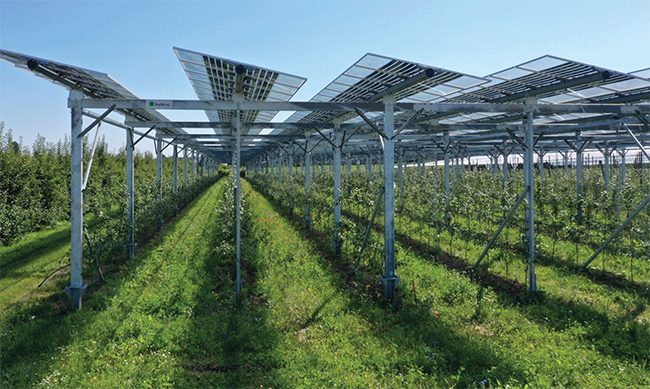BayWa r.e. Supporting Solar Power for Agriculture Projects
Solar photovoltaic (PV) installations designed to support agriculture across the European Union (EU) received a boost in late October. BayWa r.e., a major Germany-based renewable energy developer, announced it has secured €6.5 million ($7.9 million) in funding from the LIFE Programme, the EU’s funding instrument for climate action and the environment. BayWa r.e. said the money will be used to develop six projects that combine agriculture with solar power generation. The facilities will be sited in five countries and will begin operating over the next few years.
 |
|
1. This agrivoltaic facility in the German state of Rhineland-Palatinate is among the projects supported by BayWa r.e. to test the impact of different PV module configurations on plant growth and crop yields. Courtesy: BayWa r.e. |
BayWa r.e. said each of the projects is significant for their market, and in some cases are the first of their type to be developed in that country. BayWa r.e. officials said the company will work with EU representatives, landowners, and local communities to develop the projects, with a goal of demonstrating the commercial viability of what is known as “Agri-PV.” The projects (Figure 1) also are designed to show how the installation of solar power to serve agriculture can be an effective strategy for farming in Europe, particularly as it pertains to climate adaptation.
BayWa r.e. said three of the projects are part of the EU LIFE ADAPT-PV strategy. Those installations, sited in the Netherlands, France, and Spain, will show how Agri-PV can be used to supplement fruit farming at scale, a process known as fruitvoltaics. The three projects are designed to increase fruitvoltaic projects’ resistance to climate change by providing a combination of crop protection and generation of green solar energy.
Three other projects, located in Germany, Spain, and Italy, will look at ways to scale up Agri-PV alongside arable crops like summer and winter wheat or soya. Those projects are part of what’s known as the EU LIFE LEAD-PV strategy, designed to demonstrate how farmers can use land more efficiently, and reduce their emissions of carbon dioxide from their farming operations. Officials said one of the projects in Spain will be the first in that country to feature almond production. The German installation will be the first in that country to use Agri-PV alongside traditional crops at a large scale.
“With these six projects, across five countries, we’re pushing innovative Agri-PV applications into the marketplace,” said Stephan Schindele, who leads Product Management Agri-PV at BayWa r.e. “Only if the farming, environment, and energy sectors work hand in hand can we successfully adapt to climate change while also minimizing carbon footprint in farming processes.”
The EU LIFE Programme helps underwrite several projects, and also supports the EU’s Farm to Fork Strategy, which promotes programs to develop a sustainable food system. Officials said the six BayWa r.e. projects all fit within the framework of a circular land use economy, a major part of the Farm to Fork program. Data from the projects will be used to design future such installations.
“Adapting to and mitigating the effects of climate change is a key challenge for agriculture; thus, innovative initiatives which optimize land use and energy production are more than welcome. We are looking forward to collaborating with BayWa r.e., as they’ve got a wealth of agricultural and energy knowledge built up over decades,” said Bernd Decker, a representative of the European Climate, Infrastructure, and Environment Executive Agency, which was established by the European Commission. “This initiative could potentially develop our understanding in a lot of key environmental areas. Plastic waste reduction, efficient water use, cutting chemical or pesticide reliance, CO 2 emission reduction; the list goes on. All are vital co-benefits in our response to climate change.”
—Darrell Proctor is a senior associate editor for POWER (@POWERmagazine).